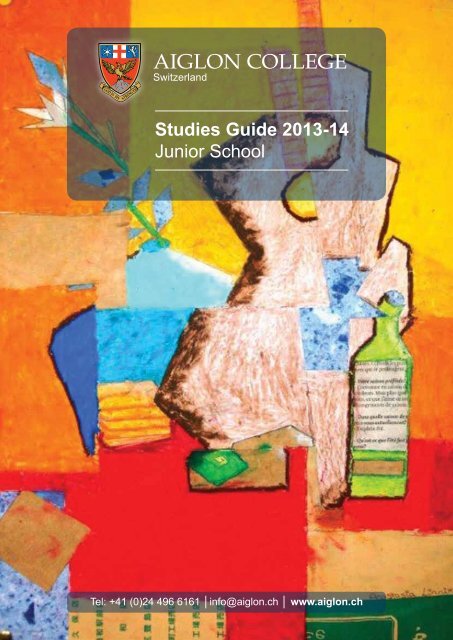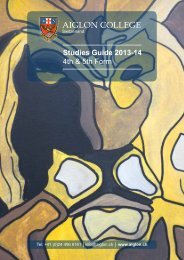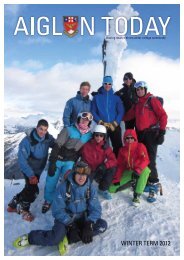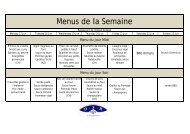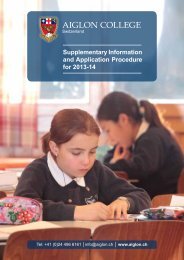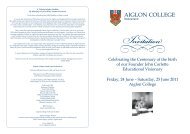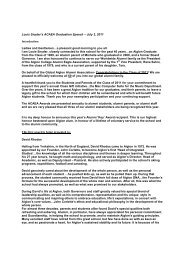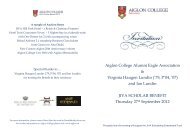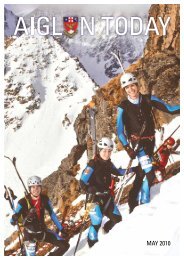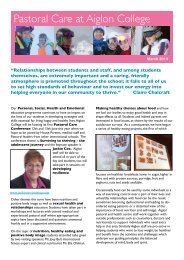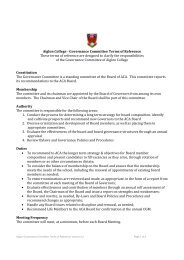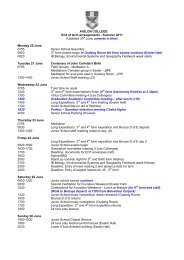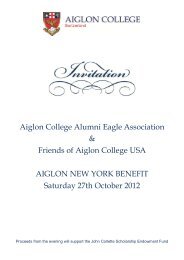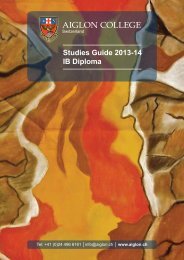Junior School Studies Guide - Aiglon College
Junior School Studies Guide - Aiglon College
Junior School Studies Guide - Aiglon College
- No tags were found...
You also want an ePaper? Increase the reach of your titles
YUMPU automatically turns print PDFs into web optimized ePapers that Google loves.
AIGLON COLLEGESwitzerland<strong>Studies</strong> <strong>Guide</strong> 2013-14<strong>Junior</strong> <strong>School</strong>Tel: +41 (0)24 496 6161 │info@aiglon.ch │ www.aiglon.ch
<strong>Aiglon</strong> <strong>Junior</strong> <strong>School</strong><strong>Studies</strong> BrochureINDEXINTRODUCTION TO THE JUNIOR SCHOOL .................................................................................................... 2<strong>Junior</strong> <strong>School</strong> Progression schematic diagram ........................................................................................ 3ESL Progression schematic diagram ...................................................................................................... 4PREPARATORY FORMSArt ..................................................................................................................................................... 5English ............................................................................................................................................... 5French ................................................................................................................................................ 6Geography .......................................................................................................................................... 6History ............................................................................................................................................... 7Information and Communication Technology (ICT)................................................................................. 7Mathematics ....................................................................................................................................... 8Music ................................................................................................................................................. 9Physical Education ............................................................................................................................. 10Religious <strong>Studies</strong> ............................................................................................................................... 10Science ............................................................................................................................................ 11Expeditions ....................................................................................................................................... 121ST, 2ND AND ESL FORMSArt ................................................................................................................................................... 13Drama .............................................................................................................................................. 14English ............................................................................................................................................. 15English as a Second Language (ESL)................................................................................................... 16French .............................................................................................................................................. 17Geography ........................................................................................................................................ 18History ............................................................................................................................................. 19Information and Communication Technology (ICT)............................................................................... 19Mathematics ..................................................................................................................................... 20Music ............................................................................................................................................... 21Physical Education ............................................................................................................................. 22Religious <strong>Studies</strong> ............................................................................................................................... 23Science ............................................................................................................................................ 24Expedition ........................................................................................................................................ 25Learning Support ............................................................................................................................... 26<strong>Aiglon</strong> <strong>Junior</strong> <strong>School</strong> <strong>Studies</strong> <strong>Guide</strong> 2013-14 1
THE JUNIOR SCHOOLHow important are one’s <strong>Junior</strong> <strong>School</strong> years? For reinforcing good habits and self-discipline, they are oftencritical; for meeting and coming to terms with the problems of community life for the first time, they arevery significant; for growing up confidently, openly and optimistically, they are crucial. If a <strong>Junior</strong> <strong>School</strong>’sfamily atmosphere of encouragement, sympathy and insistence on good standards is well-blended, young boysand girls will cheerfully learn and happily understand the importance of all of these things.This particular brochure is a supplement to the <strong>School</strong> Prospectus and aims to provide a clearunderstanding of the <strong>Junior</strong> <strong>School</strong> curriculum spanning the 9-13 age groups.The <strong>Junior</strong> <strong>School</strong> consists of three sections:• The Preparatory Forms (ages 9 – 11)• The 1st and 2nd Forms (ages 11-13)• The <strong>Junior</strong> English as a Second Language Forms (JESL: ages 9-13)For a better understanding of promotion to and from these sections please consult the schematicdiagrams on pages 3 and 4.JUNIOR ESL FORMSWith the exception of language subjects, all lessons at <strong>Aiglon</strong> are taught in English. It is assumed that all our<strong>Junior</strong> ESL students are intending to remain at the <strong>School</strong> at least until they have completed their GeneralCertificates of Secondary Education (IGCSE). On entering the Senior <strong>School</strong> from the <strong>Junior</strong> <strong>School</strong>, a certainlevel of attainment and proficiency in English is therefore compulsory. The flow diagrams on the followingpages outline in some detail the path a student might take to the 4th Form from the <strong>Junior</strong> <strong>School</strong>. Ourstudents will be taken through the Cambridge Young Learners Course, which will bring them to the standardrequired to take PET examinations.THE PREPARATORY FORMSThe curriculum is taught in English, and both English and French classes are taught in groups based on ability.Those who are beginners in English will have a special ESL course suited to their needs and will not start Frenchuntil their English is judged to be sufficiently advanced.French Set 1 aims at intermediate/advanced levels while French Set 2 caters for beginners and false beginners.In practice, this leads to graduates of these two years sitting IGCSE French earlier than would otherwise be thecase in the Senior <strong>School</strong>, thus enhancing the breadth of their final academic achievements at <strong>Aiglon</strong>.A classroom assistant reinforces the quality of the curriculum delivery in some of the lessons.Music, Sport and ICT are taught by the respective Departments to ensure a high quality of specialist teaching.<strong>Aiglon</strong> <strong>Junior</strong> <strong>School</strong> <strong>Studies</strong> <strong>Guide</strong> 2013-14 2
<strong>Junior</strong> <strong>School</strong>Progression schematic diagramTo go herePLEASE CHECK THAT ALL REFERENCES TO BPF AREREPLACED BY REFERENCES TO PREP FORMS (not PF)<strong>Aiglon</strong> <strong>Junior</strong> <strong>School</strong> <strong>Studies</strong> <strong>Guide</strong> 2013-14 3
ESL ProgressionSchematic diagramTo go here<strong>Aiglon</strong> <strong>Junior</strong> <strong>School</strong> <strong>Studies</strong> <strong>Guide</strong> 2013-14 4
PREPARATORY FORMS (PREP FORMS)ArtPrep Form 1: The programme aims to give pupils a basic understanding of many of the key elements of art: line,colour, tone, pattern, texture, shape and form. Pupils are introduced to colour theory, collage cut-outs,mono-printing and textile painting, and we will study world-renowned artists such as Piet Mondrian, WassilyKandinsky, Friedensreich Hundertwasser, Henri Matisse and Georgia O’Keefe. In addition we will look atmulticultural art - such as Aboriginal dot painting, African mask making and Native American textiles - tochallenge pupils’ relief, decorative, imaginative and 3D skills.Prep Form 2: The programme comprises 2D and 3D work, aiming to develop pupils’ knowledge andunderstanding of the key elements of art such as line, colour, tone, pattern, texture, shape and form. Pupils areintroduced to different techniques, including collage and printing, and use a range of materials such as charcoal,paint, ink, tin foil and cardboard as well as online resources. Vincent Van Gogh, Paul Klee, Jackson Pollock andGeorges Seurat are just some of the inspirational artists focused on during the year. 3D projects take differentforms, but include sculpture and mosaic-making.EnglishSyllabusEnglish follows the English National Curriculum Key Stage 2 in the Prep Forms, and Key Stage 3 in the 1stand 2nd Forms for those who are fluent or almost fluent English speakers.Our broader aims are to:• Enable pupils to develop as articulate speakers who can express themselves accurately and fluently, usingextended vocabulary;• Encourage pupils to develop good listening and concentration skills;• Enable pupils to be fluent, independent readers who enjoy reading for pleasure;• Give pupils the opportunity to experience a wide variety of reading materials and literature;• Teach pupils the correct forms of English grammar and punctuation;• Give pupils the opportunities to write under different stimuli and for a variety of reasons;• Encourage pupils to present their work neatly, in an organised fashion and using extended vocabularyin the correct contexts.English as a Second LanguageThe ESL Programme, available in Prep Forms and the 1st and 2nd Forms, aims to:• Develop pupils’ listening and comprehension skills through oral activities and games;• Enable them to use English grammar and tenses correctly;• Develop their skills in sentence structures and English usage, both in the written and spoken forms;• Provide opportunities to learn and practise a wide range of vocabulary through reading, written workand especially oral work;• Encourage them to learn to read and articulate in English, and to develop as fluent independentreaders;• Gradually develop their written skills so they can write comprehensively for different purposes e.g.stories, conversations, explanations and descriptions.How will my child cope in a mixed ability language class?There are several language levels within our small class groups where pupils work with two or three others ofsimilar ability to either make a start on their English or build on to the English they already have. As the yearprogresses, so too do the pupils’ language abilities, and the beginners in ESL often reach a stage in the courseof the year where they can merge with and work alongside mainstream pupils and benefit from the experienceof the English speakers.<strong>Aiglon</strong> <strong>Junior</strong> <strong>School</strong> <strong>Studies</strong> <strong>Guide</strong> 2013-14 5
FrenchHow is French taught at PF level?French is taught for five periods each week and is mainly aimed at communicating within our local environmentwhether with peers or around the town. The aim is also to become aware of other cultures and languages since thisshould then give students a greater understanding of their own cultural and linguistic background.French is taught as a Modern Foreign Language for beginner students. It is also taught as a native and / or secondlanguage at a more advanced level in order to further students’ skills in the language.SyllabusThe syllabus gives equal importance to all four communication skills: listening, reading, speaking and writing. Theemphasis for the beginners is on listening and speaking with the other skills gradually catching up. The pupils’ workis assessed mainly on communication as well as language and content.Both groups work with the Galore Park French books 1 and 2 as well as a wide range of material.GeographyWhy Geography?Geography is about understanding:• The natural world;• The interactions of people with each other and their environment.How is Geography taught in the Prep Form?Prep Form Geography is taught for three hours every other week, and the approach is strongly practical. Pupilsare familiarised with maps using atlases and ipads, both in the classroom and outside, where we use our localenvironment for examples and practical fieldwork. There are also traditional classroom lessons in which pupilsengage in teamwork and project work and explore the available resources. (The aim of enhancing the pupils’English is of course not forgotten!)Syllabus• Geography skills: map work and graph skills• Human geography: tourism, settlements and our local mountain environment• Physical geography: climate, seasons, the water cycle, coasts• Environmental geography: current events.There is some flexibility built into the schemes of work, which allows the teacher to spend more time on aparticular topic depending on the aptitudes and interests of the class.<strong>Aiglon</strong> <strong>Junior</strong> <strong>School</strong> <strong>Studies</strong> <strong>Guide</strong> 2013-14 6
HistoryHow is History taught in the Prep Form?Prep Form History is taught for three hours every other week. Pupils are encouraged to develop independentresearch skills using a variety of sources including books and ipads. At the end of the course pupils should beable to identify causal links between different historical events. The main aim of the course is to enable topupils to develop a strong sense of place and time.Syllabus• History skills: chronology, sources, anachronisms, legends, attack and defence• Ancient Egypt or Ancient Greece (Olympic year)• Inventions: pre-history to modern times• World War 2The schemes of work are not rigid and if one topic really captures the imagination of the pupils then more timemay be spent on it.ICTThe Prep Forms attend one hour-long class per week, with one computer per pupil.SyllabusThe course covers a wide curriculum and includes the following topics:• <strong>Aiglon</strong> <strong>College</strong> Acceptable Use Policy• Emails and calendars• Word processing to produce posters• <strong>Junior</strong> <strong>School</strong> touch typing course• Setting up filing structures• Controlling devices• Analysing data and asking questions• Graphic modelling• Data logging through monitoring environmental changes• Multimedia presentations• Understanding the internet and advanced searching techniques• Internet safety.<strong>Aiglon</strong> <strong>Junior</strong> <strong>School</strong> <strong>Studies</strong> <strong>Guide</strong> 2013-14 7
MathematicsThe Maths programme follows the English National Curriculum for Key Stage 2 in Prep Forms 1 and 2.This offers a broad and varied syllabus that makes use of a range of teaching and learning styles includinginvestigation, practical work and problem solving as well as practice of operations. We aim to equip thepupils in the Prep Forms with the necessary Maths skills, vocabulary and knowledge to provide them with asolid framework for their entry into the 1 st Form.Maths is probably the subject least affected by the multilingual nature of the class, where we cater fordifferent ability levels to enable each pupil to progress at his or her own pace. A classroom assistant allows forthe differentiated activities for those students needing either extra support or extra challenges.SyllabusThe programme covers mathematical skills in: number, shape, data handling and measurement.The programme aims to teach students to:• Understand the basic number skills and operations in addition, subtraction, division andmultiplication;• Understand and use mathematical language appropriately;• Select and use appropriate materials and equipment;• Choose appropriate ways of recording information;• Make basic use of a calculator.<strong>Aiglon</strong> <strong>Junior</strong> <strong>School</strong> <strong>Studies</strong> <strong>Guide</strong> 2013-14 8
MusicHow is Music taught in the Prep Form?One hour per week is allocated to the study of Music within the academic timetable. Lessons are creative andpractical with listening, basic composition, knowledge and understanding of music being developed throughboth class and solo performances and appraisal of different musical styles. Listening activities areinterspersed with practical sessions to reinforce knowledge and understanding of each topic. Pupils have theopportunity to perform music using traditional and electronic instruments, either individually or as part of anensemble. At this early stage, in addition to instrumental performances and activities, a large emphasis is placedon singing in order to encourage more musical awareness and the exploration of the pupils’ voices, and also onrecorder work to reinforce their understanding of musical notation.Outside the classroom, all pupils have the opportunity to take weekly individual lessons in a wide range oforchestral instruments, voice, guitar, piano and percussion. To compliment this, there are variousextra-curricular ensembles the pupils can join. These rehearse weekly and perform regularly throughout theyear at our lunchtime concerts or termly <strong>Junior</strong> <strong>School</strong> concerts. In addition, Prep Form pupilsautomatically become members of the Prep Form Choir, which also rehearses each week and performs atvarious concerts and church services each term.During each topic, pupils’ performances and/or compositions are assessed and regular listening tests orquizzes are given to evaluate their knowledge and understanding of the subject. The Department follows thecriteria laid out in the whole-school assessment policy, although there are no formal end-of-term examinationsin Music for Prep Form pupils.Whether learning an instrument, studying music formally in the curriculum or performing, all students areactively encouraged and supported in the development of technical skills, musical knowledge and, morefundamentally, in discovering a love of music for life. The Music Department believes passionately that musicshould be totally engaging, enjoyable and at its best, life changing.SyllabusPrep Form 1 Autumn term: Rhythm/pulse; basic notation; singingWinter term: Egyptian drumming; singingSummer term: Instruments of the orchestraPrep Form 2 Autumn term: Form and structure; elements of musicWinter term: Graphic scoresSummer term: Introduction to samba; Medieval/Renaissance musicThis syllabus recognises the beginning of a progressive music curriculum which is run throughout all yeargroups at <strong>Aiglon</strong>, establishing and developing the fundamental musical skills required at an early age.<strong>Aiglon</strong> <strong>Junior</strong> <strong>School</strong> <strong>Studies</strong> <strong>Guide</strong> 2013-14 9
Physical EducationWhy Physical Education?Physical Education offers pupils the opportunity to explore and appreciate physical skills, strategies and tacticswithin the context of sport, gymnastics and recreational activity. It seeks to embrace human movement as apleasurable and rewarding aspect of an active lifestyle and as an integral part of our culture.How is Physical Education taught in the Prep Forms?Courses in the Autumn and Summer terms are taught by qualified Physical Education teachers. Pupils followstructured units of study from the following categories of activity: invasion games, net-wall games, athleticactivities, gymnastics and swimming. In the Winter term, pupils follow a twice-weekly course in alpine skiingwith instruction from the Swiss Ski <strong>School</strong> and there is an introduction to cross-country skiing at weekends.Some pupils opt to train and race with the alpine racing team and there is an opportunity to snowboard in theirfree time. Informal assessment is ongoing and pupils receive effort mark readings throughout the term andformal assessment grades at the end of term.Who takes Physical Education?All pupils take Physical Education. During the week the Prep Forms have four hours of classes whilst skisessions last two hours on a twice-weekly basis. After-school options and clubs cater for those with thedesire to further pursue their skills and interests. Teams compete in football, skiing, swimming, athletics andcross-country running.Religious <strong>Studies</strong>Spirituality is an important element of a well-rounded education. Through studying different Faiths, thestudents develop their knowledge and understanding about values, morals, tradition, different cultures,purpose in life, tolerance and the concept of belief. The students are encouraged to question and makereasoned and informed judgments on religious and moral issues. Citizenship is addressed within this subject aswell as in weekly tutor meetings. An introduction to the Bible including:The programme in this year provides an introduction to the major world religions and an introduction to theBible.Topics covered include:• Key beliefs and practices• Origins and main characters (founders)• Sacred texts and stories• Festivals• Worship• Symbols• Historical context, similarity with other religions and relevance and importance today.• Citizenship issues (e.g. self-esteem, bullying, peer pressure and human rights) through Biblicalstories and parables.In both years, pupils learn through discussion, television and digital media, practical activities, writing anddrama.<strong>Aiglon</strong> <strong>Junior</strong> <strong>School</strong> <strong>Studies</strong> <strong>Guide</strong> 2013-14 10
ScienceWhat is <strong>Junior</strong> Science?Science in the <strong>Junior</strong> <strong>School</strong> comprises topics drawn from the major sciences - Physics, Chemistry and Biology -linked together in an interesting and thought-provoking manner.The aim is to provide a stimulating introduction to Science that inspires a fascination for the natural world andhow it is ordered.How is <strong>Junior</strong> Science taught at <strong>Aiglon</strong>?Practical investigations, project work and independent learning are important features of the course. Theemphasis is very much on the science of everyday life and examples are drawn extensively from the pupils’own experience. A range of teaching aids is used to encourage and engage students in their studies and tostimulate, challenge and enthuse them.Who takes Science?As an integral part of a balanced curriculum and helping to satisfy the natural curiosity of children of this age,Science is compulsory for all pupils in the <strong>Junior</strong> <strong>School</strong>.SyllabusThe curriculum is based on Key Stage 2 Science in the UK, and adapted to the interests and needs of ourpupils.Prep Form 1• Humans as organisms• Animals and their habitats• Materials and their properties• Earth, sun and moon• Electricity and magnets.Prep Form 2• Plants• Keeping healthy and nutrition• Gases around us• Reversible and irreversible changes• Forces in action• Light and sound.<strong>Aiglon</strong> <strong>Junior</strong> <strong>School</strong> <strong>Studies</strong> <strong>Guide</strong> 2013-14 11
ExpeditionsWhat are Expeditions?Expeditions are an integral part of school life at <strong>Aiglon</strong> and they are compulsory for all pupils. We believe thatour programme builds confidence, fosters independence and encourages personal and social responsibility.Basic expeditions involve walking and either camping or staying in dortoirs in the local area.With the Prep Forms we learn camp-craft skills and map reading, do activities that encourage appreciation ofthe beautiful and natural world around us and play games to develop social and personal skills.When do they take place?The Prep Form expeditions take place at weekends throughout the Autumn and Summer terms - from Saturdaymorning to Sunday lunchtime or on Saturday morning until the end of Saturday afternoon. (Exact dates aredetailed in the school calendar.) There are some compulsory expeditions’ weekends and some optional dayexpeditions each term.Who leads these expeditions?A qualified professional, helped by an enthusiastic team of teachers and volunteer Senior <strong>School</strong> pupils.Will my child be able to cope?The Prep Form pupils greet the expeditions with much excitement and the large majority opt for more than theminimum required. We intend to give a positive first experience of <strong>Aiglon</strong> expeditions and the activities areplanned with the 9-11 age groups in mind. The expeditions are adapted to make the best of the weatherconditions and the children carry only a small day sack. Whilst a child unused to physical activity may find thewalking challenging, for the majority of pupils the real challenges are looking after their possessions and livingcompatibly in a tent.What equipment do they need?Equipment is provided by the <strong>School</strong> Shop or can be bought privately by parents. An equipment list isdistributed at the beginning of each term along with a letter detailing our plans.<strong>Aiglon</strong> <strong>Junior</strong> <strong>School</strong> <strong>Studies</strong> <strong>Guide</strong> 2013-14 12
1st, 2nd and ESL FORMSArtHow is Art taught at <strong>Aiglon</strong>?The Art Department is home to all Art pupils at <strong>Aiglon</strong>. The <strong>Junior</strong>s work in the same studios as some of themost senior Art pupils, often at the same time. Lessons follow a sequence which introduces a variety of tasks,concepts and experiences. Particular emphasis is given to safety and the appropriate use of materials.Who takes Art?1st Form students have two hours of Art a week and 2nd Form students have one.Syllabus for 1st and 2nd Form ArtArt classes are structured lessons in which we aim to cover a number of basics (see Introductory Topicsbelow). Emphasis is on appropriate tasks using safe materials and equipment. Projects vary from very short,one-lesson projects, to more extended projects which may take as much as half a term, for example ceramicwork. Both year groups are taught by specialist teachers in painting and sculpture. At the end of the two yearseach pupil should have experienced working in both two and three dimensions. Important aims of theDepartment are to kindle enthusiasm, encourage experimentation and develop skills in an environment thepupils find interesting, stimulating and enjoyable.Introductory topics:• Why do we study art?• What role do artists and designers play in the modern world?• How has art developed within different cultures?Practical work:• Drawing from observation• Pattern making• Colour harmony• Design decisions• Painting• Collage/photomontage• Ceramics• Form building• Sculpture.Frequently Asked QuestionsCan pupils take home what they make?Yes.Will pupils be taught sculpture as well as painting?Yes.Are <strong>Junior</strong> <strong>School</strong> pupils welcome in the Art <strong>School</strong> outside lessons?Yes, and we run a special junior Art Option once a week for those who would like more.<strong>Aiglon</strong> <strong>Junior</strong> <strong>School</strong> <strong>Studies</strong> <strong>Guide</strong> 2013-14 13
DramaWhy Drama?The benefits of Drama in the <strong>Junior</strong> <strong>School</strong> are many. The courses vary according to year group andEnglish ability but the general aims are the same. Through our Drama instruction we wish:• To provide a Drama course with stress on the English language;• To encourage communication, socialisation and cultural understanding;• To build pupils’ confidence;• To approach PSHE issues through role play and discussion;• To introduce some basic Drama skills and conventions;• To improve reading and speaking through script reading and improvisation;• To introduce basic performance and critical skills.How is Drama taught at <strong>Aiglon</strong>?The course is almost all practical, taking place in the Dance/Drama Studio in La Dacha. Each pupil receives aneffort grade and achievement grade for Mark Reading. At the end of each term each pupil receives a reportfor Drama.SyllabusThe syllabus varies with year-group and setting but the basic material falls into these main categories:• Game playing: for group dynamics and the introduction of ideas and strategic thinking;• Group work: for team building and gaining the trust and confidence of those in a given set;• Reading: either from a script or another stimulus to improve vocal skills;• Mime and movement: to concentrate on body control, interpretation and movement independentof vocal constraints;• Improvisation: to devise short pieces based on ideas and themes. These might be spontaneous orrepeated and improved upon;• Performance: using many of the skills learned above to perform, either to a class or for a select audience;• Evaluation: to enhance critical skills and in turn improve practical skills.Frequently Asked QuestionsDoes it matter if the level of my English is quite basic?The ESL groups take Drama as a set and as such their Drama will involve a greater degree of practicalEnglish learning than the other sets.Do we have big performances?There is a bi- annual show, which offers all <strong>Junior</strong> <strong>School</strong> pupils (from Prep Form up) who are interested,a chance to present the result of their efforts.In addition, there is a yearly Reading Competition for the separate form groups in which all pupilsparticipate.<strong>Aiglon</strong> <strong>Junior</strong> <strong>School</strong> <strong>Studies</strong> <strong>Guide</strong> 2013-14 14
EnglishWhy English?English is the teaching language at <strong>Aiglon</strong> and a compulsory subject all the way through the <strong>School</strong>. So if it isnot a pupil’s first language it will be especially important for him or her to take advantage of everything that isoffered in this subject. This is also because English is fast becoming the language that is shared by all nationsin all aspects of international communication.How is English taught in the <strong>Junior</strong> <strong>School</strong>?Pupils will be put into sets according to their ability and receive five hours of tuition each week. They arestrongly encouraged to develop a private reading programme as, if they can find pleasure in reading inEnglish – even if English is their first language, this will naturally enhance their learning outside the classroom.What will the course consist of?Pupils will receive:• a course book and a class reader• initial orientation sessions in the school library• at least one grammar lesson per week• one half hour spelling session each week• at least one poetry session per fortnight.They will be required to:• produce at least two written assignments every three weeks (one a major composition and theother based on reading skills);• complete two preps each week;• sit formal English Examinations in December and June.What aspects of the course will they enjoy?English as a subject is not all grammar and vocabulary. Pupils enjoy class discussions and debating, andlearning how novels enrich our lives. They may have a project to work on which will encourage them toresource the library and the Internet, and they certainly enjoy applying computer skills to writing English (andparticularly to producing a beautiful piece of poetry on word processing software).Pupils also enjoy seeing their work published in the school newspaper or literary magazine and, as an addedincentive, especially good pieces are sent to be published in the literary magazines to which all Europeaninternational schools submit.Importantly, pupils learn to look forward to being tucked up in bed at the end of the day with a goodbook.<strong>Aiglon</strong> <strong>Junior</strong> <strong>School</strong> <strong>Studies</strong> <strong>Guide</strong> 2013-14 15
English as a Second Language (ESL)An element of flexibility is retained by the <strong>School</strong> to accommodate specific situations and the individual needsof the students enrolled in any given year. The following therefore represents what should be considered asjust one possible scenario. The <strong>Junior</strong> <strong>School</strong> Head Master will be able to explain in further detail theprogramme most likely to be implemented for the following academic year.JESL1Beginner pupils enter at 10+ and follow a KET (Key English Test – elementary level) course for one yearwith the aim of moving to JESL2 after that year. The Cambridge Young Learners exams are also taken asthey merge well with KET preparation. For example, the Flyers Test is a good stepping stone towards KET.Subjects such as Science, Geography and History are taught by ESL specialists and the pupils areintegrated into the mainstream for subjects such as Maths.The pupils receive intensive English in their first term depending on ability. Some students are given theopportunity to sit the KET exam in December. A pass with “MERIT” would warrant a move to the next level inJanuary.JESL2Pupils enter at 12+ and follow a PET (Preliminary English Test – intermediate level) course for one year withthe aim of being integrated into the mainstream programme in Form 3C (particularly successful pupils may goto 3B).The pupils receive nine hours of English per week. They may be integrated into mainstream for othersubjects depending on the size and ability of the group. However they always have English in place ofFrench.As with JESL1, any particularly gifted student would be given the opportunity to sit the PET exam inDecember. A pass with “Merit” would warrant a move to the next level in January.<strong>Aiglon</strong> <strong>Junior</strong> <strong>School</strong> <strong>Studies</strong> <strong>Guide</strong> 2013-14 16
FrenchWhy French?We live in a French-speaking area of Switzerland, and an increasing number of native speakers is joiningthe <strong>Junior</strong> <strong>School</strong> via the Prep Forms. In addition, French is the major foreign language taught in theschools to which our pupils are likely to go if they leave <strong>Aiglon</strong>.How is French taught at <strong>Aiglon</strong>?In order to provide as many different levels as possible, the 1st and 2nd Forms are combined for Frenchlessons. This allows us to offer four sets, organised as follows:Set four is for beginners with no previous experience of French. Pupils start on the Expo course, learning totalk about themselves, their school, their family, where they live, etc. Reading and writing skills are alsopractised, and the course is frequently supplemented and enlivened with games and songs.Intermediate pupils are placed in sets two and three, where they continue to build on the work covered inthe first year, expanding the range of topics and vocabulary. Writing skills become progressively moreimportant in these classes.Set one is for native and near-native speakers of the language, who have well-developed comprehension andoral skills, but frequently weaker writing skills. The emphasis in this set is on developing written accuracy,while fostering an interest in reading, both as a group and individually, and at the same time systematicallyrevising the basic grammar and spelling rules. Since more pupils have been joining <strong>Aiglon</strong> from the PrepForms, this top set has become more homogeneous, including only the strongest pupils.Movement between the sets is possible to cater for the fact that pupils progress at different rates. Inparticular, a slower pupil, or one who has missed a lot of work, might move to a lower set in order to regainconfidence.Who takes French?All <strong>Junior</strong> <strong>School</strong> pupils take French, unless they are required to follow an intensive English programme (ESL)to enable them to follow the main school curriculum.SyllabusEmphasis in the early stages is on oral and comprehension skills, and this shifts progressively to writing andreading skills. Pupils learn vocabulary and structures which enable them to talk about everyday life (home,family, school, travel, etc.). In addition, pupils in set one are encouraged to read as much as possible andwriting skills are emphasised.All groups are able to use online exercises and a number of language-specific programmes are available on theschool intranet. These can all be adapted to match the student’s level, as well as to reflect the content of theircourse.<strong>Aiglon</strong> <strong>Junior</strong> <strong>School</strong> <strong>Studies</strong> <strong>Guide</strong> 2013-14 17
GeographyWhy Geography?Geography lies at the centre of all of our lives. It is about understanding:• the natural world around us;• how we live and work together in the world;• how we interact with our environment;• the opportunities and constraints facing us all in the future.Geography is also about:• learning to manage people and resources;• acquiring many important skills for life;• building tomorrow’s world;• creating a sustainable future for all of us;• developing pupils’ citizenship skills.Geography is where all subjects meet, because all aspects of the world, whether natural or human,interact across its surface. Geography has strong links with both the sciences and the humanities. It gives us abroader view of life and helps us to see how everything fits together in the world.How is Geography taught at <strong>Aiglon</strong>?The learning of Geography in the 1st and 2nd Forms is based largely on the practical investigation of thephysical and human environments. Our studies focus on:• a variety of themes and issues related to the natural, human and environmental systems of the world;• the responsible and sustainable management of these systems;• the development of a sound awareness of our environment and a sense of place at all scales, from thelocal to the global;• the development of key language and number skills; the ability to collect, present and analyseinformation; planning and teamwork. The use of ICT is well integrated within the course.Drawing on pupils’ personal experiences, we try to relate them to other places in the world and our localenvironment. There are field trips each term to provide practical opportunities to learn more about ourworld.Who takes Geography?All pupils follow the Geography course up to the end of the 3rd Form. It is also incorporated into the ESLprogramme, since it provides excellent practical opportunities for the learning and application of English skills.Syllabus1st Form:2nd Form:The techniques we use in Geography; local studies (including a study of Chesières and theeffects of the <strong>School</strong> on the local climate); map skills; settlements and services; transport;ecosystems (a comparison of tropical and Swiss forests - their climate, ecology and use byman).Environmental concerns (climate change, energy production and a major research projecton Antarctica and its future); economic activities; a project comparing farming around theworld; industry; rivers and their management; erosion; a project on glaciation (whichconcludes with a visit to the “Mer de Glace” during the Summer Long Expedition). Themajor skills focus is on descriptive writing skills and the effective use of resources forresearch.<strong>Aiglon</strong> <strong>Junior</strong> <strong>School</strong> <strong>Studies</strong> <strong>Guide</strong> 2013-14 18
HistoryWhy History?The <strong>Junior</strong> <strong>School</strong> History courses aim to help pupils to:• enjoy the subject and develop their interest in the past;• understand the importance of evidence in the study of History and learn how to handle iteffectively;• nurture their critical thinking skills;• form their own opinions and learn how to support them with evidence;• enjoy discussion and appreciate different viewpoints and interpretations;• develop important written and communication skills;• present their work clearly and neatly.Syllabus<strong>Junior</strong>s study several very colourful and exciting periods of History.The 1st Form launches straight in with a study of the Vikings. Is our usual image of them as invaders andwarriors correct, or was there far more to them? Through texts, digital material, maps and thinking games weaim to find out. Students are also introduced to the big ideas and important skills needed for studying historysuccessfully: chronology, empathy and the use of sources, etc. These skills will be revisited and practisedthroughout our main period of study for the year. We then move on to The Middle Ages. This is a colourful andexciting time with plenty to stimulate the imagination: knights in armour, mighty castles, huge cathedrals,small villages, religious wars and ghastly punishments and tortures. Something for everyone to get their teethinto!In the first half of the 2nd Form, students are involved in an in-depth study of several different aspects ofthe Renaissance. Art, architecture, medicine, astronomy and, of course, printing, all underwent hugechanges in this period and we use texts, posters, videos and plenty of discussion to understand why thesechanges took place and to see what a huge impact they had on western civilisation. This awakeninginterest in the world led naturally into the age of exploration - our theme for the second half of the year -which offers students the opportunity for individual research using the Internet and for putting ICT skills intopractice as we look at Polar exploration and man’s attempts to get into space.ICTThis is taught in an ICT suite with one computer for each pupil. The 1st Form has one hour of ICT a week andthe 2nd Form has two hours.SyllabusThe course covers a wide curriculum:1st Form:• <strong>Aiglon</strong> <strong>College</strong> Acceptable Use Policy• <strong>Junior</strong> <strong>School</strong> touch typing course• Word processing• Data handling using databases, and data modelling using spreadsheets• Image manipulation using graphics software• Desktop publishing• Control and automation• Understanding the Internet (safety) and advanced search techniques.2nd Form:• Web design competition using HTML and Komposer.• Introduction to control using Economatics Logicator and Fishertechnik models.• Presentation techniques - introduction to video editing.<strong>Aiglon</strong> <strong>Junior</strong> <strong>School</strong> <strong>Studies</strong> <strong>Guide</strong> 2013-14 19
MathematicsWhy Mathematics?In all parts of the world, to be successful, we need to have a strong basis in Mathematics. Forexample:• We all need to be confident in the use of basic Mathematics in everyday life.• More and more professions demand a high level of mathematical skills.• To go on to study Mathematics, or a wide variety of other subjects, we need a strong foundation inMathematics.• The study of Mathematics enables us to develop good communication skills, with the emphasis onclear expression.• By studying Mathematics we can develop good problem solving techniques.At <strong>Aiglon</strong>, we aim to provide our pupils with the necessary skills to pursue Mathematics in the Senior <strong>School</strong>and beyond, but more than that, we strive to stimulate and excite the pupils to explore their environmentand to develop their powers of logical thought through Mathematics.How is Mathematics taught at <strong>Aiglon</strong>?Pupils are allocated to sets according to ability, and each set follows the same syllabus at a level appropriate forthe pupils. Classes are taught by Mathematics specialists and, while the emphasis is on high standards andhigh expectations, wherever possible we try to make the learning fun, and investigations and practical workform an integral part of our teaching. An emphasis is placed on mental arithmetic, including the mastery oftables, to give our pupils a feel for numbers, and we use computers and calculators where appropriate. Wedevelop pupils’ mathematical knowledge and skills in a way which encourages confidence and providessatisfaction and enjoyment. Pupils learn to appreciate pattern and relationships in Mathematics.SyllabusWe follow the English National Curriculum. In both the 1st and 2nd Forms, pupils will meet a mixtureof topics including arithmetic, geometry, algebra, mensuration, data handling and graphs.<strong>Aiglon</strong> <strong>Junior</strong> <strong>School</strong> <strong>Studies</strong> <strong>Guide</strong> 2013-14 20
MusicWhy Music?Music is a universal language and often allows pupils to express themselves in their own unique way. It helpsto instill confidence in their own abilities and provides the opportunity of working as a team. The overall aim forMusic is to broaden pupils’ knowledge of all types of music, including classical, popular and world, and to givethem an appreciation of the diversity of musical styles that exists today. This is achieved through performance,listening and analysing, and composition. Studying music in this way can then give pupils more of an insightinto what subjects they may eventually study later in their school life.How is Music taught?Both 1st and 2nd Form pupils are allocated two hours per week to the study of Music within the academictimetable. Pupils will have the opportunity to perform music using traditional and electronic instruments, eitherindividually or as part of an ensemble, and composing aspects of the course will take place either in thesegroups or through the use of a music-sequencing programme on the computer. Listening activities areinterspersed with the practical sessions to reinforce knowledge and understanding of each topic.Outside the classroom, all pupils have the opportunity to take weekly individual lessons on a wide range oforchestral instruments, voice, guitar, piano and percussion. To complement this, there are variousextra-curricular ensembles and choirs which pupils can join, and which rehearse weekly and perform regularlythroughout the year at our lunchtime concerts or termly <strong>Junior</strong> <strong>School</strong> concerts.During each topic, the pupils’ performances and/or compositions are assessed and regular listening tests orquizzes are given to evaluate their knowledge and understanding of the subject. The Department follows thecriteria laid out in the whole-school assessment policy, although there are no formal end-of-term examinationsin Music for 1st and 2nd Form pupils.Whether learning an instrument, studying music formally in the curriculum or performing, all students areactively encouraged and supported in the development of technical skill, musical knowledge and, morefundamentally, in discovering a love of music for life. The Music Department believes passionately that musicshould be totally engaging, enjoyable and, at its best, life changing.Syllabus1st Form2nd FormAutumn term: World music with emphasis on Switzerland, Africa and Indonesia.Winter term: Jazz and RagtimeSummer term: Keyboards and triads; re-creative popularAutumn term: Theme and variations; back to the 60sWinter term: Minimal and serial musicSummer term: The musical and the human voiceThis syllabus is a continuation of a progressive music curriculum which is run throughout all years at <strong>Aiglon</strong>(starting in the Prep Forms), establishing the fundamental musical skills required at an early age. Anidentical music curriculum is delivered to both the 1st Form and ESL1, and likewise to the 2nd Form andESL2.<strong>Aiglon</strong> <strong>Junior</strong> <strong>School</strong> <strong>Studies</strong> <strong>Guide</strong> 2013-14 21
Physical EducationWhy Physical Education?Physical Education offers pupils the opportunity to explore and appreciate physical skills, strategies and tacticswithin the context of sport, gymnastics and recreational activity. It seeks to embrace human movement as apleasurable and rewarding aspect of an active lifestyle and as an integral part of our culture.How is Physical Education taught at <strong>Aiglon</strong>?Courses in the Autumn and Summer terms are taught by qualified Physical Education teachers. Pupils followstructured units of study from the following categories of activity: invasion games, net-wall games, athleticactivities, gymnastics and swimming. In the Winter term, pupils follow a twice-weekly course in alpine skiing,with instruction from the Swiss Ski <strong>School</strong>, and there is also an introduction to cross-country skiing. Somepupils opt to train and race with the alpine racing team and there is the opportunity to snowboard in their freetime. Informal assessment is ongoing and pupils receive effort mark readings throughout the term and formalassessment grades at the end of term.Who takes Physical Education?All pupils take Physical Education. During the week, the 1st and 2nd Forms have four hours of classes whilstski sessions last two hours on a twice-weekly basis. After-school options/clubs cater for those wishing tofurther pursue their skills and interests. Teams compete in football, skiing, swimming, athletics andcross-country running.<strong>Aiglon</strong> <strong>Junior</strong> <strong>School</strong> <strong>Studies</strong> <strong>Guide</strong> 2013-14 22
Religious <strong>Studies</strong>Why Religious <strong>Studies</strong>?Religion is a great force in the world, whether for good or bad. Many people’s lives are affected by religion andin an international boarding school it is important that students have an appreciation of the religions of thosearound them.Within <strong>Aiglon</strong>’s, ‘Guiding Principles’ is a commitment that the education provided at <strong>Aiglon</strong> should lead to thebalanced development of the whole person. A spiritual dimension is included in this development and theteaching of Religious <strong>Studies</strong> plays an important role in this.How is it taught at <strong>Aiglon</strong>?All students in the 1st and 2nd Forms (including ESL classes) are taught for one period a week. The syllabus isas follows:1st Form:• Brief study of the Bible as a library• Teaching of some Old Testament Bible stories• The New Testament as an historical document• The life of Jesus including the events of Holy Week• Judaism.2nd Form:• Christianity as a religion: history, main beliefs, different denominations• Islam• Buddhism.<strong>Aiglon</strong> <strong>Junior</strong> <strong>School</strong> <strong>Studies</strong> <strong>Guide</strong> 2013-14 23
ScienceWhat is <strong>Junior</strong> Science?Science in the <strong>Junior</strong> <strong>School</strong> comprises topics drawn from the major sciences - Physics, Chemistry and Biology -linked together in an interesting and thought-provoking manner.The aim is to provide a stimulating introduction to Science that inspires a fascination for the natural world andhow it is ordered.How is <strong>Junior</strong> Science taught at <strong>Aiglon</strong>?Practical investigations, project work and independent learning are important features of the course. Theemphasis is very much on the science of everyday life and examples are drawn extensively from the pupils’own experience. A range of teaching aids is used to encourage and engage students in their study of scienceand to stimulate, challenge and enthuse them.Who takes Science?Science is compulsory for all pupils in the <strong>Junior</strong> <strong>School</strong>, being an integral part of a balanced curriculum andhelping to satisfy the natural curiosity of children of this age.Pupils in the ESL section take a Science course that is based on the mainstream course, but the emphasis isplaced on acquiring a general science vocabulary, and developing certain science-orientated skills and thewritten expression of scientific ideas.SyllabusThe curriculum is based on Key Stage 3 Science in the UK, and adapted for the interests and needs of ourpupils. The course is supported by the International Science course books and workbooks, published by HodderEducation.1st Form:• Doing Science• Characteristics of living things• Cells and organ systems• Reproduction• Acids and bases• Physical and chemical changes• The particle model• Mixing and separating substances• Forces• Flight• Pressure2nd Form:• Measuring in science• Food and digestion• Circulation and breathing• Respiration• Flowering plants• Understanding Ecosystems• Atoms and elements• Molecules and compounds• Metals and non metals• Chemical reactions• Energy transformations• Speed, time and distance• Heat• The Solar System<strong>Aiglon</strong> <strong>Junior</strong> <strong>School</strong> <strong>Studies</strong> <strong>Guide</strong> 2013-14 24
ExpeditionsAt the weekends the <strong>Junior</strong>s have the opportunity to join our very popular Expedition programme, in whicheach pupil selects at least three weekends per term from a diverse and exciting range of activities. Mostpupils opt to do more than the minimum requirement and several choose to go every weekend. Activities andadventure are combined with skill learning, environmental awareness and, probably the most importantfeature, that of learning to work closely with others in often-challenging situations.In the Autumn and Summer terms most expeditions are in tents although in the colder months pupils might stayin mountain huts or even a snow-hole. Activities include walking and navigating, orienteering, cycling,canoeing and rock climbing. The three-day-long expedition takes place at the end of the year and in the case ofthe second form provides a steppingstone to the Senior <strong>School</strong>’s independent expeditions. Indeed, some <strong>Junior</strong>smake this step as fully-fledged “expedition leaders”.In the Winter term the programme includes ski touring, alpine skiing, cross-country skiing and snow-shoeing inthe local alpine environment. Weekend expeditions take place over just one day and involve training towardsthe long expeditions of three days in the mountains. These provide a unique opportunity to travel in the winteron skis to some interesting and spectacular locations, and involve staying in mountain huts, developingstamina and willpower, and working together.This vibrant expeditions programme is run by a specialised and highly-qualified team, with the additionaluse of mountain guides in the Winter term.Frequently Asked QuestionsWill my child be able to cope?Although the term may conjure up images of tough, extended trips, our expeditions mostly last less than 24hours and are carefully chosen to match the abilities of the student. No reasonably fit child is going to find ourexpeditions too arduous. The <strong>School</strong> is divided into groups according to skiing ability and fitness forexpeditions and every effort is made to place each boy and girl in a suitable group.What equipment do they need?All equipment can be provided by the <strong>School</strong> Shop. Outdoor clothing is provided as part of the school uniformand is used for expeditions and skiing. Other specialised equipment is either provided by the <strong>School</strong> Shop orlocal suppliers. This includes specialised sleeping bags and mats, rucksacks, head torches and water bottlesand equipment for ski-touring. Any other equipment is provided by the <strong>School</strong> and lent to the pupils when theyare on expedition.<strong>Aiglon</strong> <strong>Junior</strong> <strong>School</strong> <strong>Studies</strong> <strong>Guide</strong> 2013-14 25
Learning SupportAll students (and adults for that matter) learn in different ways. For those who would benefit from additionallearning support at this stage in their schooling, there are three fully-qualified Learning Support staff. Theregular sessions with these teachers are designed to assist the students with their normal academic loads, aswell as to equip them with the means to be able to work around their learning difficulties, thus increasingconfidence and self-esteem. It may be necessary to seek a greater depth of understanding of a particularchallenge that a student may be facing. If this is the case, the Head of Learning Support will contact theparents seeking permission to undertake an Educational Psychological assessment. This is often the normalroute for any specialist Learning Support intervention to be accessed.Learning Support is offered to students on the basis of need, on the strength of comprehensive testing and inconsultation with parents. These sessions are conducted either on an individual basis or within small groups,and the normal rate for private tuition is payable. In some classes, a specialist teacher attends in a teamteaching role.Learning Support aims to give a directional approach to learning, each student, through consultation with theLearning Support specialist, reports and observations, is set specific targets which are referred to each lesson.These targets are evaluated regularly by the student and the specialist Learning Support teacher and will becommented on in the student’s Mark Reading. Classroom teachers are made aware of these requirements.All <strong>Junior</strong> <strong>School</strong> students needing Learning Support are fully integrated into the normal school programme.Some students who need a minimal amount of learning support can complete a full academic programme withthe addition of extra time in tests and examinations. While it is not desirable or appropriate to allow extra timefor all assessment tasks, the <strong>School</strong> arranges for extra time in internal exams as necessary.We always aim to meet the needs of our students through regular monitoring and careful consultation betweenthe Learning Support Department, teachers and Houseparents. However if, in the Head Master’s opinion, the<strong>School</strong> cannot provide for a student's needs (academic or pastoral) a transfer to an alternative (perhaps morespecialised) school may be required. In such cases, <strong>Aiglon</strong> will do all it can to identify a suitable alternativeschool and assist with the transfer process.<strong>Aiglon</strong> <strong>Junior</strong> <strong>School</strong> <strong>Studies</strong> <strong>Guide</strong> 2013-14 26
Notes<strong>Aiglon</strong> <strong>Junior</strong> <strong>School</strong> <strong>Studies</strong> <strong>Guide</strong> 2013-14 27
Notes<strong>Aiglon</strong> <strong>Junior</strong> <strong>School</strong> <strong>Studies</strong> <strong>Guide</strong> 2013-14 28
AIGLON COLLEGESwitzerlandAvenue Centrale 611885 ChesièresSwitzerlandTel: +41 (0)24 496 6161Fax: +41 (0)24 496 6162info@aiglon.chwww.aiglon.chJune 2013Cover artwork by Anastasia Linnik


